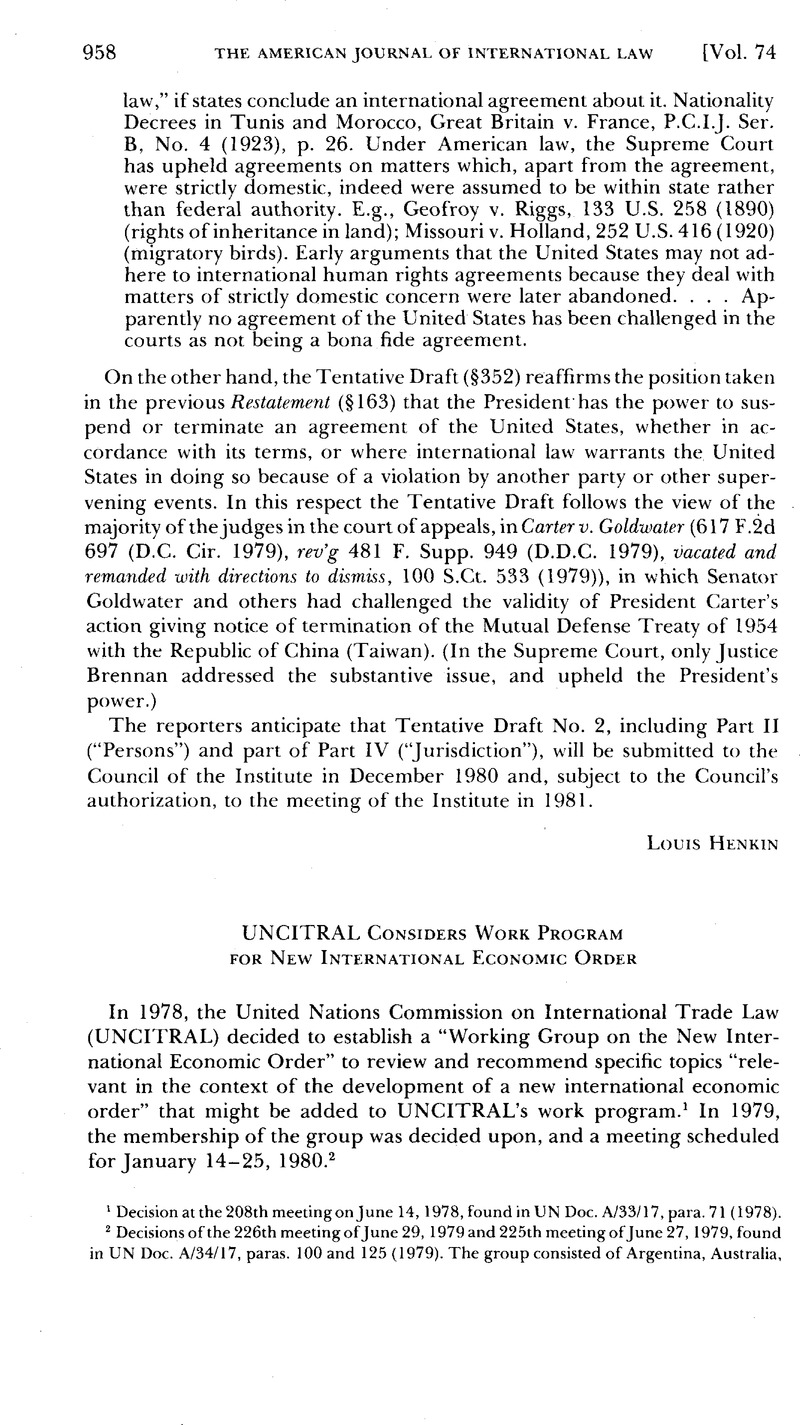No CrossRef data available.
Article contents
UNCITRAL Considers Work Program for New International Economic Order
Published online by Cambridge University Press: 27 February 2017
Abstract

- Type
- Current Developments
- Information
- Copyright
- Copyright © American Society of International Law 1980
References
1 Decision at the 208th meeting on June 14, 1978, found in UN Doc. A/33/17, para. 71 (1978).
2 Decisions of the 226th meeting of June 29, 1979 and 225th meeting of June 27, 1979,found in UN Doc. A/34/17, paras. 100 and 125 (1979). The group consisted of Argentina, Australia,Chile, Czechoslovakia, France, the German Democratic Republic, the Federal Republic of Germany, Ghana, India, Indonesia, Japan, Kenya, Mexico, Nigeria, the USSR, the United Kingdom, and the United States. In addition to these 17 member countries, 26 other countries and 9 international organizations participated as observers. The Working Group's report is UN Doc. A/CN.9/176 (1980).
3 An excellent overview, The United Nations Commission on International Trade Law: Mission and Methods, by John Honnold, former chief of UNCITRAL's Secretariat, the UN Trade Law Branch, can be found in 27 Am. J. Comp. L. 201 (1979).
4 UN Doc. A/C.6/34/SR.25, para. 20 (1979).
5 UN Doc. A/CN.9/171 (1979).
6 The specific topics listed were:
(1) Legal aspects of multilateral commodity agreements.
(2) Study aimed at identifying legal issues arising in the context of foreign investment that might be suitable for consideration by the Commission.
(3) Study on intergovernmental bilateral agreements on industrial co-operation.
(4) Harmonization, unification and review of contractual provisions commonly occurring in international contracts in the field of industrial development, such as contracts on research and development, consulting, engineering, supply and construction of large industrial works (including turn-key contracts or contrats produit en main), transfer of technology (including licensing), service and maintenance, technical assistance, leasing, joint venture, and industrial co-operation in general.
(5) Identification of concrete legal problems arising from the activities of transnational corporations, having regard to, in particular, the need for co-ordination of work with other competent bodies in this field.
(6) Study on concession agreements and other agreements in the field of natural resources taking into account the work carried out by other competent bodies in this field and the need for co-ordination.
UN Doc. A/CN.9/176, para. 31 (1980).
The Working Group also recognized that other topics not included could be regarded as relevant to the development of a new international economic order. The report notes, for ex- ample, that international commercial arbitration was omitted only because it was already a priority item on UNCITRAL's work program; regulation of the warehousing contract, liability of terminal operators, and the recently concluded Convention on the Carriage of Goods by Sea were also specifically mentioned. Id., paras. 10, 33, and 35.
7 Id., para. 13.
8 The major accomplishment of this session was the adoption of the final UNCITRAL Conciliation Rules; the General Assembly is now invited to recommend their use “in cases where a dispute arises in the context of international commercial relations and the parties seek an amicable settlement of that dispute by recourse to conciliation.“
9 UN Doc. A/CN.9/176, para. 32 (1980).
10 UN Doc. A/CN.9/191 (1980).


